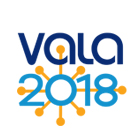
Creating a research information website amidst strategic change: transforming the researcher’s experience
VALA2018 CONCURRENT SESSION 8
Wednesday 14 February 2018, 11:25 – 11:55
Deanne Holmes, Ursula Amato and Matthew Brightwell
Defence Science and Technology Group
Please tag your comments, tweets, and blog posts about this session: #vala2018 #s20
Abstract
Websites are becoming the digital ‘front door’ to information services, greatly enhanced by innovative technologies and design that extend the user experience in information discovery. A well-designed library website is essential to meet requirements for good functionality, usability by clients, and improved administration and content authoring. This paper shares the development and design of a new website to reflect the Defence Science & Technology Group’s (DST) transformation of its traditional library service to Research Information Services digital delivery.

This work is licensed under a Creative Commons Attribution-NonCommercial License.




